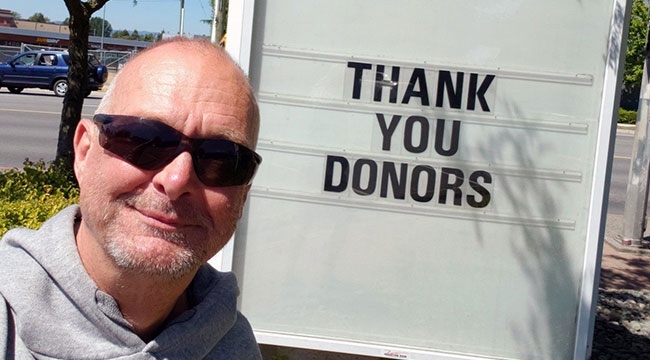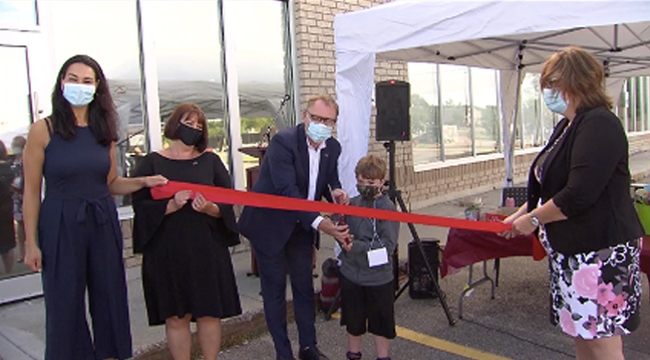Medication from plasma spurs recovery from terrifying illness
Without immunoglobulin, Jeff Brown could have been permanently disabled by Guillain-Barré Syndrome
Jeff Brown will likely never learn why, in his mid-thirties, he was suddenly struck with a rare disorder that paralyzed him within days and kept him in hospital for months. But he's so grateful for the donations of plasma that helped him avoid permanent disability from Guillain-Barré Syndrome (GBS).
The 44-year-old father from Capreol, Ont. recalls how it all began.
"I was at work one day and I just wasn't feeling good," says Jeff, an engineer/conductor with CN Rail. "My back was sore and I had some tingling in my hands and feet. And I just thought maybe I had a pinched nerve in my back. Then when I got home from work, my balance was off."
Jeff saw a nurse practitioner, who suspected a vitamin B12 deficiency and recommended shots. But when he collapsed in the night on the way to the bathroom, he knew he needed to go to the hospital. Doctors worried he might have multiple sclerosis or even Lou Gehrig's disease (amyotrophic lateral sclerosis) before diagnosing him with GBS. The condition, which affects approximately one in 100,000 people, causes the immune system to attack nerve cells.
“I think I went in on a Thursday, and by the end of the weekend I was pretty much paralyzed from the neck down," says Jeff. "It progressed really fast."
The cause of Guillain-Barré Syndrome is unknown, although unlike Jeff, about two-thirds of patients report having had an infection in the six weeks prior. One of the only effective treatments is immunoglobulin, a medication made from the proteins found in donated plasma — a straw-coloured component of blood. Jeff's treatment involved several infusions of immunoglobulin, each delivered intravenously over a period of hours. It was after those treatments that he began to sense feeling returning to one of his legs — a first sign of hope for recovery.
Learn how donated plasma is made into medication
Circle of support includes plasma donors
Still, it would be about five months before Jeff could leave the hospital. Trouble breathing and heart problems kept him in intensive care for several weeks. When he moved to rehabilitation he was in a wheelchair and doctors told him there was a chance he'd need it permanently.
"To have a doctor tell you 'this could be it for you,' it's tough," says Jeff.
Plasma recipient celebrates 10 years, 1,000 donations with 100 km fundraiser
Securing Canada’s supply of plasma
Jeff credits the support of his wife, Kara Lepki, daughter, Preslee Brown, his parents and friends for giving him the strength he needed to recover.

Jeff Brown, left, seen here with his daughter, Preslee, received immunoglobulin to treat Guillain-Barré syndrome. Immunoglobulin is derived from plasma, a straw-coloured blood component that can be donated at many Canadian Blood Services sites, including a new plasma donor centre in Sudbury, Ont.
Jeff will never meet the plasma donors who contributed to his essential medication, but they were also vital members of that circle of support. They’ve made it possible for him to walk and to work, though his strength and stamina are reduced and he continues to have numbness and nerve pain in his legs and feet.
Find out where to donate plasma
Recovered from COVID-19? Consider donating plasma for clinical trials to help other patients
When he thinks of those plasma donors, Jeff also thinks of the impact they had on his family and all those who care for him. Because of them, his now 11-year-old daughter doesn't have to endure the stress and challenge of a parent's poor health or disability. It makes him an enthusiastic supporter of Canadian Blood Services' new plasma donor centre in nearby Sudbury,
Ont., which opened in its new permanent location in December 2020. He knows that every donor he inspires can make a big difference, not only to patients, but to their families and communities.
“One person can change a lot of people’s lives,” says Jeff.
Plasma donors help patients with Guillain-Barré Syndrome (GBS) and many other disorders. The donations are used to manufacture immunoglobulin and other lifesaving medications. To book an appointment at a Canadian Blood Services donor centre, including the new plasma donor centre in Sudbury, Ont., visit blood.ca/donate, download the GiveBlood app or call 1 888 2 DONATE.



